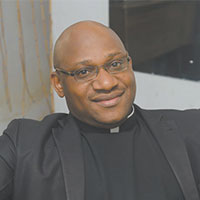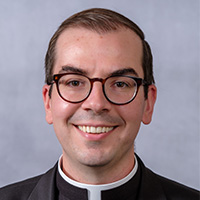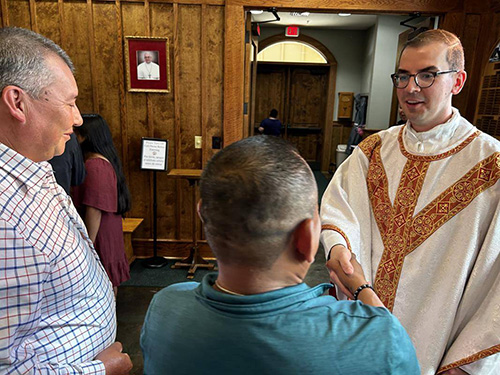 I am often asked, especially by my college students, why I became a priest. I’d usually say: to serve and to save! And they’d say, “What?”
I am often asked, especially by my college students, why I became a priest. I’d usually say: to serve and to save! And they’d say, “What?”
So I’d explain further: To serve God and to help save souls for the Kingdom! As easy as that sounds, it is quite deep and tough.
When I look back and remember how my priestly journey began in Lagos, Nigeria having worked briefly at a parish before becoming the Secretary to the Cardinal and the Archdiocesan Master of Ceremonies, I never imagined in my wildest dreams that someday I’d be ministering to parishioners and college students on the other side of the Atlantic, approximately 5,500 miles away from home. I guess it is part of the calling to serve and to save!
After my ordination and first Mass, the only thing that I could think about was how blessed I am. Yes indeed, God has been so good to me, and I am continually amazed at how the Lord has continued to bless me in ways that I never thought possible. Over the past few days, I have had the opportunity to look back and reflect on what this past twenty years have been like. I keep coming back to the sentence: “My heart is full of joy.”
Celebrating the sacraments with the people and for the people has been a cause of great joy for me. While working temporarily at a parish in the Archdiocese of New York while I did my graduate studies at Fordham University, and now journeying with college students in my current assignment, has been an immense blessing for me as I am continually energized when I see my young friends who are trying to work through a very difficult stage in life. There is a great zeal and heart in these students as they wrestle with life’s big questions and challenges and figure out how they can reflect Christ to the whole world. I am so Impressed and amazed with all they do on these campuses and for themselves. Again, my heart is full of joy. Archbishop Fulton J. Sheen wrote, “A priest is not his own.” This phrase does not merely give reference to the ministerial life of a priest but to the joys and sorrows of his whole life. A priest is a public person and thus needs to be aware that a certain vulnerability is necessary for the life of the people to shape him and to help him grow as the man of God our Lord called him to be. I thank my students for helping to shape me into a better priest so I can continue to serve and to save!
Finally, thank you all for your prayers, your support, your sacrifice, and your love as you continue to inspire me to be the best priest that God has called me to be.
Know that you reflect the love of Christ and for that, my heart is full of joy.
Father Marcel Amadi is director of campus ministry at Wake Forest University.
Father Jacob Mlakar
Leading others to Jesus through sacraments, wisdom of the saints
 Father Jacob Mlakar has been appointed to pastor both St. Francis of Assisi Parish in Jefferson and St. Frances of Rome Mission in Sparta.Tuesday, Oct. 22: Father Jacob Mlakar becomes pastor of St. Francis of Assisi Parish and St. Frances of Rome Mission
Father Jacob Mlakar has been appointed to pastor both St. Francis of Assisi Parish in Jefferson and St. Frances of Rome Mission in Sparta.Tuesday, Oct. 22: Father Jacob Mlakar becomes pastor of St. Francis of Assisi Parish and St. Frances of Rome Mission
JEFFERSON — Father Jacob Mlakar was up late at Casa Santa Maria, a home for American priests studying in Rome, when he received the call that surprised him.
Monsignor Patrick Winslow, vicar general and chancellor of the Diocese of Charlotte, told him he’d been appointed to pastor St. Francis of Assisi Parish in Jefferson and St. Frances of Rome Mission in Sparta.
“I was surprised and excited to be made pastor. … It was a wonderful surprise,” said Father Mlakar, who had expected to remain an assistant pastor for a year or two more. “It gave me something to look forward to and made me all the more motivated to finish my studies.”
While it might seem daunting for a first-time pastor to take on two churches instead of one, Father Mlakar’s few months have proven a breath of fresh air for him.
“There’s a learning curve, but I am happy to serve the populations of the parish and the mission,” said the Ohio native, who earned his theology degree from the Pontifical University of St. Thomas.
“Being in Rome studying for a year, I didn’t hear many confessions. I didn’t do any anointings. Being back here, I was able to get back into those things because of my previous parish experience.”
After his ordination in 2020, Father Mlakar served as parochial vicar at St. Vincent de Paul Parish in Charlotte for a year and for two years at Holy Cross Parish in Kernersville before moving to Rome – an experience he says equipped him in both spiritual and practical ways for his ministry.
He recently shared observations from his few months as a pastor.
CNH: What does it mean to you to become a pastor?
 Father MlakarFather Mlakar: It means a great deal. This is what I’ve wanted to be, especially to be pastor in the mountains. … There’s a lot of new things I’m learning, but I am definitely enjoying being back in parish ministry after earning my licentiate and being able to take more of a leadership role in the parish.
Father MlakarFather Mlakar: It means a great deal. This is what I’ve wanted to be, especially to be pastor in the mountains. … There’s a lot of new things I’m learning, but I am definitely enjoying being back in parish ministry after earning my licentiate and being able to take more of a leadership role in the parish.
CNH: How did your studies this past year prepare you for your pastor role?
Father Mlakar: The licentiate and spiritual theology is all about the spiritual life, especially studying the writings of the saints. It was (taught) in the Dominican tradition, but we studied all the great spiritual writers.
That’s been extremely helpful in my preaching and the way I relate to people and the advice I give on the spiritual life. It’s a very good theological degree but also it is very practical for a parish priest to be able to get up and draw from the great wisdom of our spiritual tradition.
CNH: How have your first months as pastor been going?
Father Mlakar: They’ve definitely been busy, starting with moving into a new house and trying to keep a tidy house and clean office, and yet keep up with all the parish needs. I’ve been meeting with everyone to talk about the programs that are going on like faith formation, O.C.I.A. and the parish councils. They want to tell me about the good work they’re doing and see how I can support them. It’s a great example of people coming together and keeping the life of the parish flourishing.
We also began planning for the big liturgies like the Holy Hour, Vespers and Mass celebrating the 10th anniversary of our new church, plus the parish picnic afterward. A lot of it has been being there for the daily worship of God as I start to get into some of the bigger administrative responsibilities.
CNH: How have your years as a parochial vicar helped prepare you to be a pastor?
Father Mlakar: Gaining better familiarity with what I would call the human experience, especially meeting with people and ministering to them in their needs. That’s helped with the normal pastoral experience, being familiar with the sacraments.
Drawing on my experience as a parochial vicar, I was able to return to some of those things and build off routines and schedules.
CNH: What is your favorite part of being a priest?
Father Mlakar: Definitely visiting the sick and anointing the sick, because I was ordained during COVID, and when I was at St. Vincent de Paul, we were the go-to parish for one of the big hospitals in that area. At a time when many people weren’t able to get into the hospital to visit the sick, they actually were calling us pretty frequently to visit and administer the sacraments. That is a sacrament that’s always touching to administer, especially to those who are receiving it for the last time.
CNH: Can you share a part of your own spiritual life?
Father Mlakar: The everyday pastoral tasks up here involve a lot of driving. St. Frances of Rome Mission is about a 40-minute drive from St. Francis Parish in Jefferson. I’ve been on the road a lot, so I’ve had to learn how to use that time for reflection and renewal for prayer instead of listening to a podcast or something like that.
CNH: What are you reading?
Father Mlakar: During these first months as a pastor, I’ve developed a devotion to St. Gregory the Great. He has a book on pastoral care, so he has been my favorite saint recently. He was a pope in the early Middle Ages, and he wrote the go-to book for pastors even way back then, and it’s been used throughout Church history, so that’s been my spiritual reading, and he’s been my saint that I’ve been praying to and thinking about a lot.
— Annie Ferguson
Bishop Michael Martin will formally install these first-time pastors during special Masses in the coming weeks. Meet the others.


